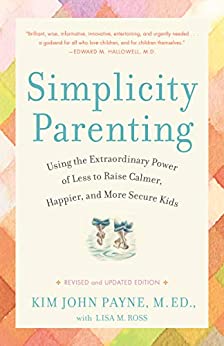More on this book
Community
Kindle Notes & Highlights
But for a while, when they are young and growing, we adults can offer the protection of more time and ease, less speed and clutter. We can be the stewards of our child’s home environment, setting limits and saying no to too many choices, too much stuff. As we’ll see in the next chapter, we can also increase the security of the environment we make for them with rhythm and predictability.
In his book Secrets of Discipline, Ronald Morrish beautifully identified the steps that parents need to take with their child: Start small, stay close, insist, and follow through.
Are such relentlessly busy kids happier when they enjoy what they’re doing? Absolutely. But is there an emphasis on enjoyment, or accomplishment? Satisfaction, or competition? And motivation is difficult to untangle between parent and child.
Is a child motivated by their own love of what they’re doing, or is their motivation colored by a desire to please? In
Rest nurtures creativity, which nurtures activity. Activity nurtures rest, which sustains creativity. Each draws from and contributes to the other.
Just as rest nourishes action, vigorous activity feeds sleep; it also feeds the imagination.
so there is time for them to build inner resources—energy, preferences, interests, resiliency—as well as expend them.
Let your kids be bored. Let them be. Sometimes in my lectures I write up a “prescription” for parents: “Boredom. To be allowed three times a day, preferably before meals.”
Anticipating gratification, rather than expecting or demanding it, strengthens a child’s will.
“an increasing and compulsive tendency to avoid pain or boredom and replace inner development with outer stimulation.”
beings. It can establish a reliance, a favoring of external stimulation over emotional or inner activity.
When every note is a high note, children lose the ability to fully engage in the present and to regulate their own time.
Without a firm
attachment to a loving caregiver, a child can suffer from chronically elevated levels of the stress hormone cortisol. Cortisol is a neural hijacker, bullying out learning and other functions to make room for its floods.
But base camps aren’t transient; they aren’t portable.


